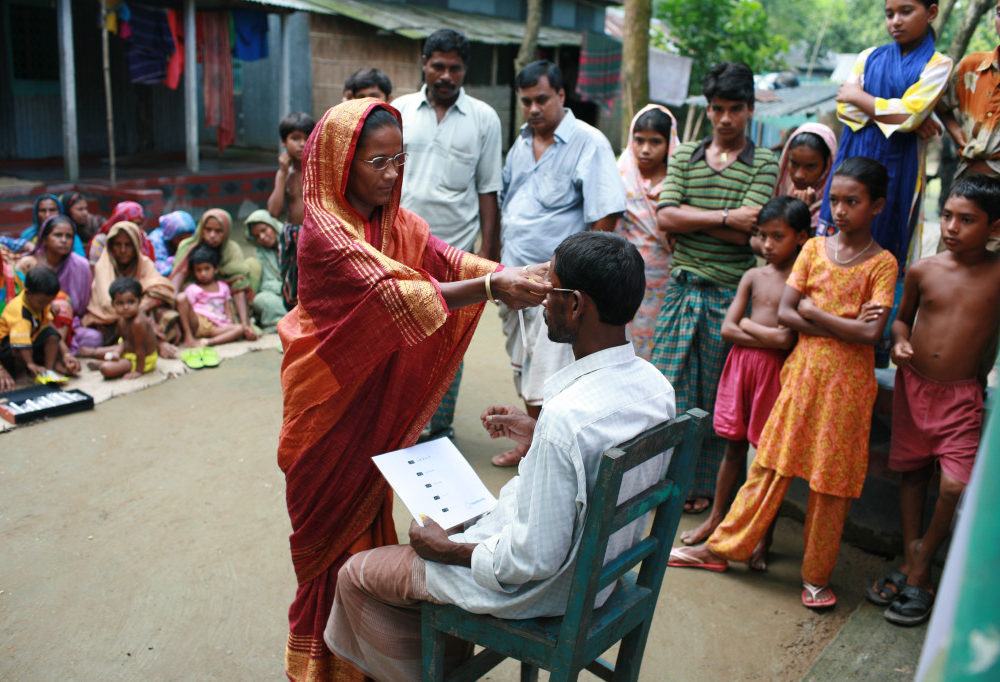
Visionspring: Affordable eyeglasses for the working poor and their families
Uncorrected vision loss prevents people from living independent lives. Without eyeglasses, artisans cannot see their goods, shopkeepers cannot manage accounts and children cannot see the blackboard. A drop in productivity among workers can push poor families further into poverty. According to conservative estimates by the World Health Organization, 703 million individuals could have their vision restored with a pair of eyeglasses, and 77% of those individuals can be helped with a pair of reading glasses that can be sourced from China for as little as $1. Visionspring establishes local capacity to deliver affordable eyeglasses in low-income communities by training local individuals to serve their communities. To date more than 1,25 mio glasses have been distributed and income for over 9000 individuals has been provided (economic impact: 216 mio USD).
Impact
Impact research conducted by University of Michigan demonstrated that users of VisionSpring eyeglasses experience an 35% increase productivity and 20% increase in monthly income. By multiplying average daily income in the regions where we work by the increase in productivity and number of pair of reading glasses sold, VisionSpring has generated over $216 million in economic impact.
Beneficiaries
VisionSpring targets the “missing middle,” people not serviced by existing eyeglasses providers: roughly 4 billion people around the world living on less than $10 a day who once educated about vision care, have demonstrated the capacity to pay for eyeglasses. These people are classifed as the working poor; they are individuals who rely on their sight to work and go to school. VisionSpring also focuses on the developing world as their citizens have little access to affordable eyeglasses. Without their sight, the working poor experience a significant drop in productivity and income which can push already vulnerable families over the edge.
VisionSpring selects our sales people, called Vision Entreprenuers, from the same community as our customers, which provides them with a consistent source of income. A growing number of women and men entrepreneurs make their living selling our eyeglasses, educating their communities about the importance of eye care, and bringing critical first-line eye care products and services to their own communities.
Sustainability
VisionSpring’s eye care delivery model rests on a combination of innovative products and services with cost-effective distribution to make a lasting, large scale impact. To address to the specific challenges of delivering vision care products to consumers in developing world, our model addresses the following core components:
AFFORDABILITY: In order to provide eyeglasses that Bottom of the Pyramid (BoP) consumers value and can afford, we create new products based on market feedback and takes a high volume, low margin approach to production.
AWARENESS: Lack of awareness is one of the greatest barriers to effective eye care intervention. We use innovative social marketing techniques such as street theatre and picture books to overcome this challenge.
ACCESS: To provide access to our products and services in low income communities, we have developed a uniquely efficient set of distribution channels. These distirbution structures are the core of our impact, acting as the connection between VisionSpring and its low income customers in urban and rural communities.
Innovation
VisionSpring operates as a social enterprise, blending the best of for-profit and non-profit providers to uncover a sustainable model that uses profits to expand our social impact and reach the hundreds of millions in need of eyeglasses. The key driver to our innovation is engaging local people to make them part of both service and product delivery. Since the traditional optical industry focuses on serving the affluent and charities distribute free eyeglasses, when available; therefore there is a very limited understanding of how to educate low-income individuals and design and price eyeglasses appropriately to match the purchasing power and preferences of this segment of the market. Using proven social marketing techniques, building optometric job skills for our Vision Entrepreneurs and optometrists/refractionists, and creating a reliable supply chain to provide affordable, culturally appropriate eyeglasses, VisionSpring is able to initiate and sustain a market for the working poor.
Scalability
For the next four years, we plan to:
- deliver reading and prescription glasses services in El Salvador and India,
- strengthen and expand our partnership with BRAC in Bangladesh, and
- establish growth capital to fund new country expansion.
The scaling of programs will be based on the following principles:
- Aggressive but prudent growth in sales and operations.
- Leveraging existing core competencies including:
- a) sourcing of low cost high quality product,
- b) ability to efficiently reach and support those without vision care in both urban and rural settings,
- c) ability to educate low-income consumers about the value of eyeglasses,
- d) ability to provide cost-effective solutions for our target market.
- Constantly monitoring and evaluating “game changing technology” that could strengthen our program implementation.
- Building in-country capacity to run its business with modest headquarters infrastructure to support expansion and related stakeholders.
Source of funding
VisionSpring uses a high-volume, low-margin approach, which ensures that we deliver a quality, affordable product that meet the needs of our customers, while generating a small profit. These profits currently pay the sales commissions of our local selling agents and we hope that over time, with increasing sales volumes, we will generate sufficient income to pay for our in-country operations.
VisionSpring will continue to raise philanthropic funds to support new country expansion with the intention of incubating a model until it reaches self-sufficiency on a country level. Addditional philanthropic funds will be utilized to support product development and building global technical capacity to strengthen our operations.